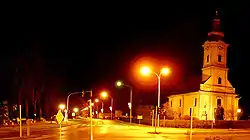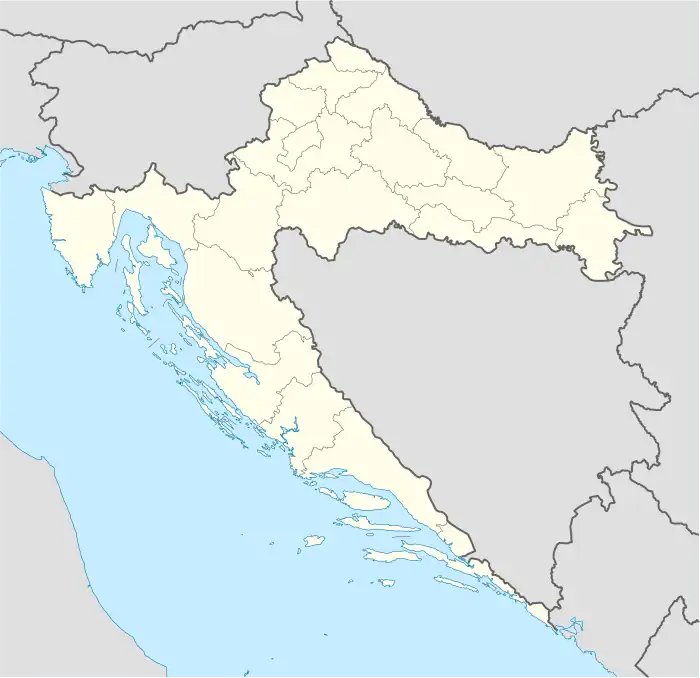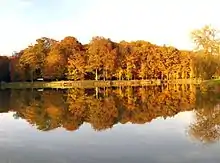Grubišno Polje
Grubišno Polje (Czech: Hrubečné Pole) is a town in Bjelovar-Bilogora County, Croatia.
Grubišno Polje | |
|---|---|
Town | |
 Church of Saint Joseph in the town center | |
 Grubišno Polje Location of Grubišno Polje in Croatia | |
| Coordinates: 45°42′08″N 17°10′20″E | |
| Country | |
| County | |
| Government | |
| • Mayor | Zlatko Mađeruh (HDZ) |
| Area | |
| • Town | 265.2 km2 (102.4 sq mi) |
| • Urban | 26.9 km2 (10.4 sq mi) |
| Elevation | 165 m (541 ft) |
| Population (2021)[2] | |
| • Town | 5,367 |
| • Density | 20/km2 (52/sq mi) |
| • Urban | 2,588 |
| • Urban density | 96/km2 (250/sq mi) |
| Time zone | UTC+1 (CET) |
| • Summer (DST) | UTC+2 (CEST) |
| Website | grubisnopolje |
Demographics
In the 1991 census, the settlement had equal numbers of Serbs and Croatians, but during the Croatian War of Independence the Croatian Serbs were ethnically cleansed, and only part of them returned later in the 1990s.
In the 2001 census, the municipality had 7,523 inhabitants, with the following ethnic makeup:[3]
- 4,692 (62.37%) Croats
- 1,356 (18.02%) Czechs
- 872 (11.56%) Serbs
- 228 (3.03%) Hungarians
| population | 6930 | 8119 | 9069 | 12664 | 14785 | 15809 | 15532 | 16101 | 13037 | 13792 | 13370 | 11772 | 10506 | 9716 | 7523 | 6478 | 5367 |
| 1857 | 1869 | 1880 | 1890 | 1900 | 1910 | 1921 | 1931 | 1948 | 1953 | 1961 | 1971 | 1981 | 1991 | 2001 | 2011 | 2021 |
Politics
Minority councils and representatives
Directly elected minority councils and representatives are tasked with consulting tasks for the local or regional authorities in which they are advocating for minority rights and interests, integration into public life and participation in the management of local affairs.[4] At the 2023 Croatian national minorities councils and representatives elections Czechs, Hungarians, Roma and Serbs of Croatia each fulfilled legal requirements to elect their own 15 members minority council of the Town of Grubišno Polje with Serb community electing 14 members into their council.[5]
History
In the late 19th and early 20th century, Grubišno Polje was a district capital in the Bjelovar-Križevci County of the Kingdom of Croatia-Slavonia.
Sights

The town has a memorial to its deceased from the Croatian War of Independence.[6]
Settlements
The administrativne area of the Town consists of 24 settlements (as of 2011), namely:[7]
- Dapčevački Brđani, population 50
- Dijakovac, population 32
- Donja Rašenica, population 164
- Gornja Rašenica, population 89
- Grbavac, population 211
- Grubišno Polje, population 2,917
- Ivanovo Selo, population 264
- Lončarica, population 79
- Mala Barna, population 30
- Mala Dapčevica, population 3
- Mala Jasenovača, population 5
- Mala Peratovica, population 65
- Mali Zdenci, population 436
- Munije, population 35
- Orlovac Zdenački, population 285
- Poljani, population 261
- Rastovac, population 40
- Treglava, population 103
- Turčević Polje, population 44
- Velika Barna, population 335
- Velika Dapčevica, population 32
- Velika Jasenovača, population 58
- Velika Peratovica, population 26
- Veliki Zdenci, population 914
References
- Register of spatial units of the State Geodetic Administration of the Republic of Croatia. Wikidata Q119585703.
- "Population by Age and Sex, by Settlements, 2021 Census". Census of Population, Households and Dwellings in 2021. Zagreb: Croatian Bureau of Statistics. 2022.
- Census 2001 - Bjelovar-Bilogora County, Croatian Bureau of Statistics
- "Manjinski izbori prve nedjelje u svibnju, kreću i edukacije". T-portal. 13 March 2023. Retrieved 10 June 2023.
- "Informacija o konačnim rezultatima izbora članova vijeća i izbora predstavnika nacionalnih manjina 2023. VII. BJELOVARSKO-BILOGORSKA ŽUPANIJA" (PDF) (in Croatian). Državno izborno povjerenstvo Republike Hrvatske. 2023. p. 11-12. Retrieved 10 June 2023.
- "Dan Grada Grubišno Polje (City Day of Grubišno Polje)". Archived from the original on 2011-07-21. Retrieved 2008-11-23.
- "Population by Age and Sex, by Settlements, 2011 Census: Grubišno Polje". Census of Population, Households and Dwellings 2011. Zagreb: Croatian Bureau of Statistics. December 2012.
